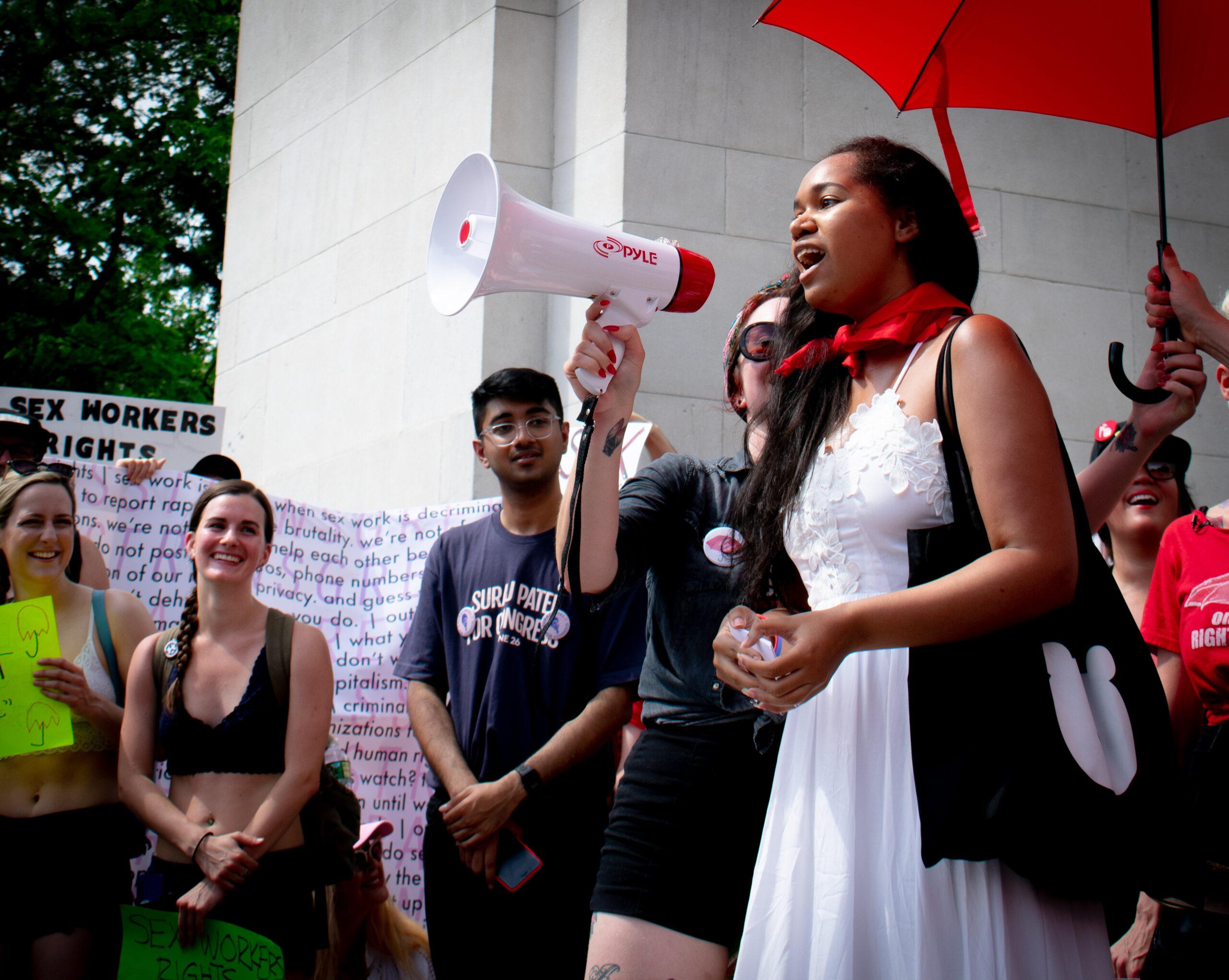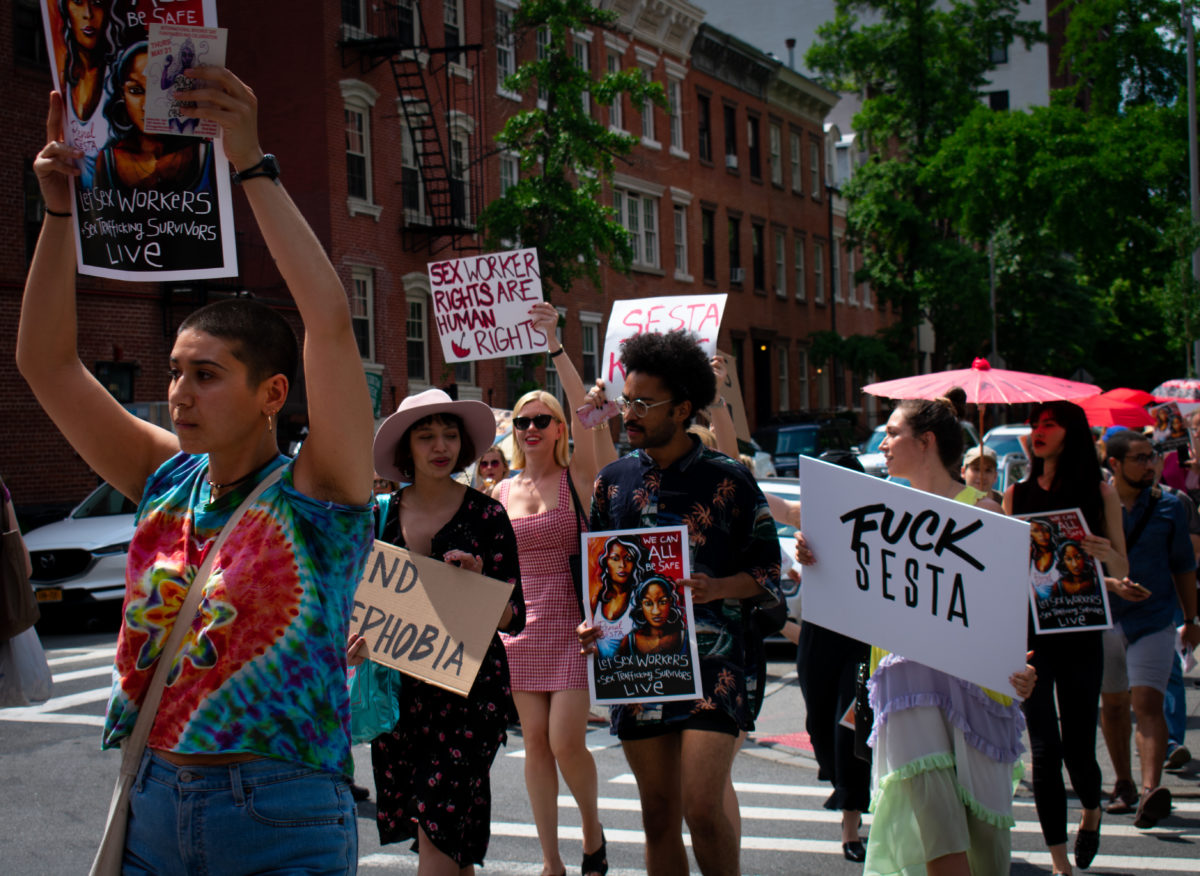‘Whores Will Rise’
As part of International Whores’ Day, hundreds gathered in New York City to protest new anti-sex work laws.

Hundreds of sex workers and their supporters spilled into the streets around the historic Stonewall Inn on Saturday demanding an end to laws that endanger them. The New York City protest was part of International Whores’ Day (IWD), marking the anniversary of sex workers’ occupation of churches throughout France in 1975 in opposition to anti-prostitution policing. This year, the day took on new urgency with the passage of SESTA/FOSTA, a federal measure targeting online sex work signed into law by President Trump in April that has also galvanized sex workers across the United States. Spirited IWD protests were seen in cities including Chicago, Oakland, Washington, D.C., and Minneapolis.
Since the passage of SESTA/FOSTA this spring, sex workers have reported an increase in encounters with abusive clients and with law enforcement, the result, they say, of the websites on which they advertise their services—like Cityvibe and Craigslist’s personals section— going offline due to fear of prosecution. In addition to losing their advertisements, online forums which sex workers relied on to share information about safer sex work and dangerous clients have explicitly barred sex workers in the United States, or simply disappeared. SESTA/FOSTA has pushed online sex work further to the margins, making it much more dangerous; one sign, hoisted by a demonstrator in a black ski mask and pale pink sunglasses read, “FOSTA has a bodycount.”
The New York protest began with a march from Stonewall and ended with a raucous rally in Washington Square Park, one of the largest sex workers’ rights demonstrations ever held in the United States. Many of the speakers acknowledged those they already lost—long before SESTA/FOSTA—to violence. “I was crying back here because I have buried so many children. I’ve seen so many girls get murdered,” said Ceyenne Doroshow, the founder and director of GLITS, a New York City-based organization led by and supporting transgender sex workers. Earlier this year, Doroshow defended herself from a man she said attacked her, and then she had to fight criminal charges brought against her by the Queens district attorney as a result of the incident. Even after her attorney presented detailed accounts of abuse, as The Appeal reported, the DA refused to dismiss the case outright. To those gathered in Saturday’s searing heat to protest SESTA/FOSTA, Doroshow proclaimed, “Before I did this, I was a ho. I will always be a ho!” There were cheers and applause. “I’m gonna survive. You’re gonna survive.”
The protest was organized in part by sex workers’ rights activists campaigning as Survivors Against SESTA, formed this winter, who helped make the legislation a national issue. One Survivors Against SESTA activist, who did not use a name because she fears for her safety, addressed the rally, at that point around 400 strong. They repeated her words, loudly and in unison, to better amplify them across the protest. “I stand in awe of our resilience,” she said. “Last week, my friend was assaulted by a new client she was unable to screen, after FOSTA. … Legislators know they are killing us. In private conversations they say, we understand. But when it’s time to vote, they conveniently forget.”

To directly assist those who are struggling with a loss of income in the wake of SESTA/FOSTA, sex workers have raised funds for and from each other. Dominique, who helps run the sex worker mutual care fund Lysistrata, explained that the funds empower sex workers to refuse risky work. “It is downright nauseating,” said Dominique, “to see our mutual care fund strained and our members facing ever-magnifying physical and financial stress after the passage of SESTA/FOSTA while millions pour into the coffers of anti-prostitution organizations…. Let me make this abundantly clear, sex work is work!… It is an industry not of victims, and not even an industry of necessarily happy hookers—and that is okay.”
One of SESTA/FOSTA’s most vocal supporters in Congress, Representative Carolyn Maloney of New York, now faces a Democratic primary challenge from Suraj Patel, who attended the protest and urges the repeal of SESTA/FOSTA. “I implore our representatives, current and new—potentially,” said Dominique, “to cast off your old tired ethics!” (This was a reference to one of the first U.S. sex workers’ rights organizations, COYOTE, formed in 1973, and whose name was an acronym for those same words.)
Campaigns like Survivors Against SESTA are new, but the demands they made are decades old. Survivors Against SESTA timed its actions with International Whores’ Day, a day of celebration and protest that honors the sex workers who occupied churches in five French cities, beginning with Lyon on June 2, 1975, to protest anti-prostitution policing. When police moved in to remove them, the interior minister—who was also the head of police—claimed their protests were a front for those who profit from the “white-slave trade.”
Such attempts to link sex work to sexual slavery live on: They were central to the passage of SESTA/FOSTA, which was described by supporters as a means to save women and girls from being sold for sex or from being trafficked by threatening legal action against the websites where ads for sex work appeared. Yet some anti-trafficking organizations, including the nation’s largest network of anti-trafficking service providers, joined sex workers in opposition to SESTA/FOSTA, on the grounds that it would increase danger in the sex trade while doing little to protect people from trafficking. One sign seen at Saturday’s protest reflected the unity between sex workers and trafficking survivors on SESTA/FOSTA: “We can all be safe. Let sex workers and sex trafficking survivors live.”
As the rally occupied the space surrounding Washington Square Park’s arch, protestors learned that across the river in Brooklyn, one New York woman working to change anti-sex work laws sat in jail. Tiffaney Grissom said that the previous night she was in the Brooklyn neighborhood of Bushwick, and at about 4 a.m. she was arrested and charged with “loitering for the purposes of prostitution.” Grissom, who is Black and trans, is also a plaintiff on a class action suit challenging this law, charging it is unconstitutional and that the New York Police Department enforce it disproportionately against Black and Latinx women.
Sixteen hours later, Grissom was still waiting for her court appearance. When I met her in 2016, she told me she had engaged in sex work sometimes, but most of the time that she was charged with loitering she was just hanging out. “It’s a way to arrest a lot of people for nothing,” said Cynthia H. Conti-Cook, a staff attorney at The Legal Aid Society, who is involved in bringing the class action suit against the loitering law and who Grissom called after her Saturday arrest. “It seemed like an easy arrest,” Grissom told The Appeal just outside the Brooklyn court where she was released just before 9 p.m. on Saturday. “I don’t need to have to prove myself as to why I’m outside, or defend myself for being outside.”
Though SESTA/FOSTA is what drove hundreds of sex workers and supporters to Washington Square Park on Saturday, it is just one of many U.S. laws criminalizing sex workers not only for their work, or the right to be in public, but for their survival. Near the rally’s close, the words of Alisha Walker, an incarcerated sex worker, were heard. In 2016, Walker, a Black woman in her 20s, was convicted in Cook County, Illinois, of second-degree murder and sentenced to 15 years in prison for defending herself against a client who demanded unprotected sex and then attacked her and a co-worker. One of the Survivors Against SESTA organizers, Red, is part of the Justice for Alisha Walker defense campaign, and shared Alisha’s statement for International Whores’ Day at the rally. Red asked the crowd again to repeat Alisha’s words so that even those crowding the edges of the rally could make them out. “Why is everyone scared of whores?” asked Alisha, through Red. “Well, shit. Maybe they should be.” The crowd roared, then repeated along: “Whores. Will. Rise.”
